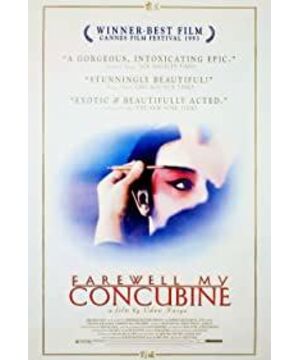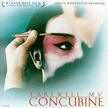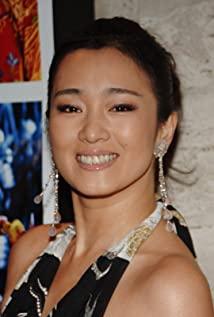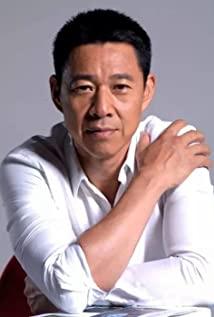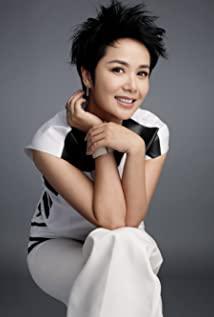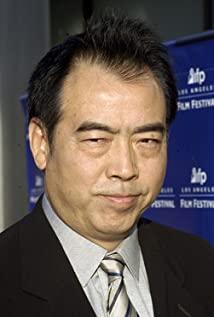This is an old article, which was hastily completed a few months ago. Today, it is broken and reorganized, and it still has an aftertaste to read.
After all, great art is immortal, whether it's paintings, music, or movies.
I have said more than once that great work is always multi-dimensional. A thousand readers have a thousand overlords and a thousand concubines.
A Farewell My Concubine does not sing the voice of a generation of literati, but sings the fragility of human nature and the strength of artists for thousands of years.
At the beginning of the story, Concubine Yu walked slowly from the dim alley, holding the Bawang. At the end of the alley was a square, and echoes could be heard in the open space.
But the square was even darker, and they could only be seen vaguely by the light coming from the alley.
Duan Xiaolou (played by Zhang Fengyi), who plays the overlord, is always confused.
The man asked: You two haven't sung together for more than 20 years, right?
Duan Xiaolou (one said Duan Xiaolou) confusedly said twenty-one years, and Cheng Dieyi corrected that it was twenty-two years. Duan Xiaolou said that the two of us hadn't seen each other for ten years, and Cheng Dieyi corrected it and said it was twelve years.
The reason boils down to the phrase "it's all caused by the Gang of Four", but the Gang of Four is never mentioned in the whole movie.
Cheng Dieyi is the greatest artist image I've ever seen in a movie, bar none.
From the beginning of the sentence "I am a man, not a female Jiao'e", his backbone was different from that of ordinary people.
Cheng Dieyi is a typical representative of a generation of literati. They are strong, arrogant, withdrawn but talented.
The first time he entered the troupe, the group of children laughed at him that he came out of the kiln, and that the warm clothes in his hands were from the kiln. He didn't say anything and threw the clothes into the brazier and burned them.
Xiao Laizi, who escaped from the troupe with him, was full of "brilliant words", but when he returned, he was so frightened that he hanged himself.
But Cheng Dieyi only said one sentence: "Master, I ran by myself, it's none of my brother's business." The children around were kneeling and trembling with fear, but he did not beg for mercy, who was beaten on the cold bench.
In the face of his brother being detained by the Japanese, he went to sing for the Japanese, but he said, "There is a man named Aoki, he knows drama."
On the bench, he even said, "If Aoki doesn't die, Peking Opera will be spread to Japan."
All of this is in line with Duan Xiaolou's sentence "If you don't go crazy, you won't survive."
Cheng Dieyi is not an absolutely positive image in the traditional sense, and he lacks a "family and country feeling" in his ideology.
In other words, for him, Peking Opera and senior brothers are above everything else in the world. He once said, "No, it's a good lifetime, but a year, a month, a day, an hour...not a lifetime."
He wants to sing the drama of a lifetime with his senior brother!
But Duan Xiaolou didn't think so. If Cheng Dieyi is not the same as the world, then Duan Xiaolou is a mortal.
Duan Xiaolou also has a backbone. He refuses to sing for the Japanese, which is a bit like Mei Lanfang's beard. Facing Dieyi's sentence "Aoki knows drama", he slapped Cheng Dieyi.
Duan Xiaolou is a person who understands life. He sings like crazy, not fake, but he is also crazy in life. In this world, in this crowd of mortals, how can he survive?
Duan Xiaolou understood this truth, so he could give in and bear it, so he finally survived.
In the face of the big-character posters and the Criticism Meeting, Duan Xiaolou gave in. He admitted that his wife was a prostitute, his junior and junior brothers were traitors, and he admitted all the mistakes he had made. Because of this, he became one of thousands of people in that era.
So what are all the millions of people doing?
Cheng Dieyi lacks a sense of "home and country", but the original author Li Bihua does.
From the Revolution of 1911 - the separatist rule of warlords - the period of the Anti-Japanese War - the Civil War between the Kuomintang and the Communist Party - the Great Leap Forward - the Cultural Revolution...
The motherland has experienced too much in the past 100 years, and the life of the little people who lived in that 100 years has tasted too much.
The film is from the period of warlord rule until the end of the Cultural Revolution. All kinds of characters come on stage, which is quite playful.
The eunuch director of the previous dynasty was still dreaming about the previous dynasty. When asked what year it was, Xiaodouzi (Cheng Dieyi) said that it was the 21st year of the Republic of China, but he said it was the 24th year of Xuantong in the Qing Dynasty.
The old eunuch thought he was a glorious eunuch in charge, but unexpectedly, the eunuch's house became a coffin shop, and the eunuch became a wandering beggar.
Facing the student parade, the hawkers were most worried about their own business, and they couldn't understand the students' patriotic protest behavior. And the students who were parading in the streets saw the actors, and they called them demons, and asked whether the actors had a Chinese conscience.
When Cheng Dieyi was caught taking drugs, everyone came to visit him, hoping that Bawang and Yu Ji would return to the arena.
When the Cultural Revolution came, it was the same group of people who accused him of being a traitor.
It has been emphasized in many classic movies that in a peaceful and prosperous world, people will be at peace, and society will be harmonious.
When encountering turmoil, the ugly side of human nature will be infinitely magnified. This can be seen when Duan Xiaolou reports and exposes his close relatives.
The public's cognition of society is still limited to the state of "no matter how the dynasty changes, your uncle is still your uncle". It was not until the local tyrant Yuan Siye was shot and the inherent cognition was broken that he woke up.
In that time of turmoil, there were only two kinds of people, those who oppressed others and those who were oppressed by others.
But from today's point of view, it's just a group of ordinary people struggling to survive in the big society, subdivided into the hearts of everyone at that time, but people can't beg for death.
Cheng Dieyi survived the Cultural Revolution, and finally chose to commit suicide, Yu Ji died in the arms of the overlord. He probably wanted to understand that there is no way to keep pure people in this world, and even if he survives, he will not be able to sing the drama with his senior brother for a lifetime.
In the movie, there are several interesting little objects:
They are the bricks shot by Duan Xiaolou, the sword sent by Cheng Dieyi and the crown sent by Yuan Siye.
Xiao Shi, who has not yet gone by the pseudonym Duan Xiaolou, displayed his iron-headed skills heroically on the street, showing the heroic spirit of the young man.
When I was young, I went to the kiln, broke the tea bowl with the top of my head, and took the top card of the brothel back home.
And what about when you get older? During the fight, the Red Guards threw him a brick, and he smashed the brick on his head, causing his head to bleed.
Brick or brick. Now if you ask him anything, he will answer honestly, saying that his wife is a prostitute and his brother is a traitor. It's not that his head is not hard enough, but that his integrity has been worn away by life.
It was the first time to perform Farewell My Concubine. Duan Xiaolou and Cheng Dieyi saw a sword in the eunuch's mansion. Cheng Dieyi said that one day he would give it to his senior brother.
On the day of the brother's wedding, Cheng Dieyi gave him the sword, but the brother forgot that promise.
This sword finally became the "evidence" for Duan Xiaolou's accusation against Cheng Dieyi, and its last appearance was in a performance between them, and Yu Ji used this sword to slay herself.
Cheng Dieyi lived in the play, and finally left the world as Yu Ji.
The crown given by Yuan Siye was full of gems and radiant. Cheng Dieyi's adopted orphan Xiao Si Er traps him in injustice. In the end, when the greedy Si'er secretly played with the crown, he was beaten to death by the Red Guards.
Greed makes people evil, and evil destroys greedy people. It will not be repeated here.
And the strong contrasts and huge contrasts in the movie:
Overlord is firm, Yu Ji is soft.
Duan Xiaolou's temperament is rigid, while Cheng Dieyi's temperament is soft.
When he was a child, Duan Xiaolou (Little Stone) dared to perform iron head kung fu. In order to fulfill Xiaodouzi (Cheng Dieyi), he used a cigarette rod to drill his mouth. Facing Yuan Siye's "cultivation", he also ignored him. Don't even give a good look. The students even dared to go up and say a few words when they were parading in the street. The boy's bloodiness is unmistakable.
And Cheng Dieyi learned that Duan Xiaolou was going to marry his daughter-in-law, and his arrogance, resentment, depression and sadness were vividly reflected by Leslie Cheung.
Not with words, but actions, turning back, twisting, frowning, complementing each other.
It was raining and raining outside the window. Cheng Dieyi wrapped her arms around the sword and walked into the room with small steps. Word: "You recognize it".
Naturally, this small building cannot remember the origin of the sword. Cheng Dieyi blinked and lowered her head. He suddenly raised his head to look at the group photo of the two of them, with tears in his eyes, as if there was light, Cheng Dieyi's chest heaved slightly, and with a sigh, the light disappeared.
He took small steps and walked outside again, until he walked outside the door, and when his emotions erupted, he staggered into the darkness.
Duan Xiaolou's temperament is tough, but his bones are soft. Cheng Dieyi is soft at heart, but tough at heart.
During the Cultural Revolution, Duan Xiaolou became softer, and many people would be softer. He said something against his will and hurt innocent people. But Cheng Dieyi was not convinced, and faced with the accusations and abuses of the Red Guards, he still held his head high and said, "If Aoki doesn't die, Peking Opera will spread to Japan."
Every time Duan Xiaolou couldn't bend Dieyi, he would say that if he was not crazy, he could not survive, that was drama, not life! Not to be confused.
In the end, he could only succumb and say that Dieyi was a person living in the play.
At the end of the movie, Cheng Dieyi is still Cheng Dieyi. And everyone else is not what it used to be. It makes people want to ask, who is living and who is acting?
View more about Farewell My Concubine reviews


